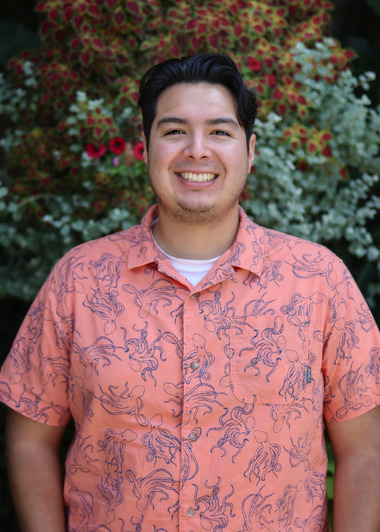Jasper Gomez
Jasper Gomez is an MGI doctoral student working in Chris Waters' lab. Here are his answers to the Micro Biography questions:

How and when did you become interested in the field(s) of microbiology, genetics, and/or immunology?
My interest in science started at a young age through watching shows like The Magic School Bus and Bill Nye the Science Guy. My interest kept growing through middle school and high school thanks to my many fantastic science teachers. When applying to Michigan State University for my undergraduate, I wanted to study biomedical engineering however, when I was filling out my application I accidently selected biomedical laboratory sciences, or BLS. I didn’t realize my mistake until welcome weekend where I heard more about the major I’d selected. I decided to give BLS a shot which was the right move, because I am awful at math. During my time in college is where I discovered my interest in microbiology and genetics.
Were there any particular people or events who were influential in your journey?
There were many teachers that were influential in my journey. My high school teachers, Ms. Gannon and Mr. Lindemulder, taught me the basics of being a scientist and introduced me to scientific experiments. My college professor, Dr. Frances Downes, was also a huge influence as her advanced medical microbiology class was one of my favorite classes during my time as an undergraduate.

Additionally, I took her study abroad class in the summer in Malawi where we focused on infectious diseases in East Africa - an experience that I will never forget as it drove me to study microbiology. All these people made huge impacts on my journey, but the most influential person is Dr. Kyle Card. Kyle was a graduate student in Dr. Rich Lenski’s lab studying the evolution of antimicrobial resistance in the Long-Term Evolution Experiment. Kyle was looking for an undergraduate to help him with his project and asked Dr. Frances Downes (the professor he was a TA for) to send an email to her students. I was lucky enough to get this email and I applied to be Kyle's undergraduate research assistant. We hit it off immediately and that summer I began to work in the lab. From day one, Kyle was a fantastic mentor. Everything I know about how to think like a scientist, how to perform experiments and how to be a mentor is all thanks to Kyle. To this day, we are still very close friends.
How did you come to be a part of this department?
I became part of MGI back when it was still MMG in summer of 2016 when I joined Dr. Rich Lenski’s lab as an undergraduate research assistant. I worked with Dr. Kyle Card on the evolution of antimicrobial resistance in The Long-Term Evolution Experiment. I am now a graduate student in Dr. Chris Waters lab here in MGI, studying the interactions between bacterial host and their viral predators known as bacteriophage.
What is your main research area right now and why is it important?
Phage therapy, which uses bacterial viruses known as bacteriophage to treat microbial infections, is growing in importance due to antimicrobial resistance. Although phage therapy is a great alternative to antibiotics, bacteria can protect themselves from phages by using various molecular defense systems. My research focuses on identifying and describing novel phage defense systems in Vibrio cholerae, the causative agent of cholera, with the goal to create more efficient phage therapeutics and to discover new genetic tools to push the scientific field forward.
How do you see your research evolving?
My research right now is leading me to focus on how phage have evolved to escape the detection of certain defense systems leading to many new interesting questions I hope to explore in my overall career.
What types of activities are you involved in outside of work?
Outside of work, I play soccer in a few adult leagues in Lansing. I also enjoy playing video games, traveling and discovering new breweries around town.
Is there anything else you’d like to share?
Before pursuing my PhD, I worked at the Michigan Bureau of Laboratories and then I came back to MSU and work for the COVID-19 detection program (aka the Spit Lab). I wanted to mention this because I think it’s important to try new things. My trajectory to being a microbiologist was not linear, but I wouldn’t be here without the experiences I had before!
What is next for you?
Hopefully I'll graduate and continue doing phage research as a post-doc - wherever that might be!
What do you see as your current career trajectory?
Currently, I am still aiming to become a PI and continue phage research. I want to
be able to give others the opportunities and mentorship I have been so privileged
to receive.